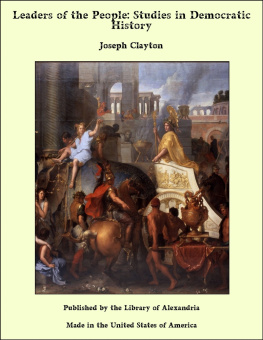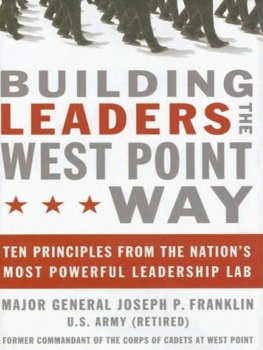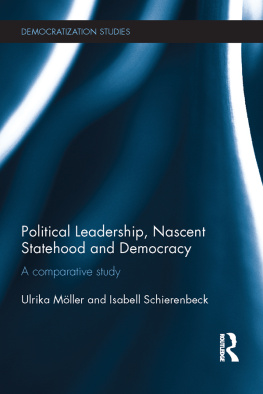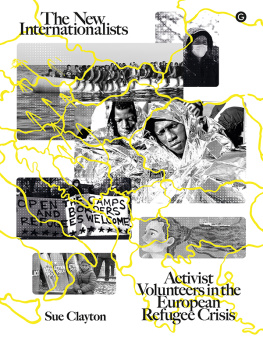THE RISE OF THE DEMOCRACY
BY
JOSEPH CLAYTON
Author of "Leaders of the People" "Bishops as Legislators," etc. etc.
WITH EIGHT FULL-PAGE PLATES
CASSELL AND COMPANY, LTD.
London, New York, Toronto and Melbourne
1911
ALL RIGHTS RESERVED
KING JOHN GRANTING MAGNA CHARTA
From the Fresco in the Royal Exchange, by Ernest Normand.
By permission of Messrs. S. Hildesheimer & Co., Ltd.
PREFACE
This short account of the rise of political democracy is necessarily but an outline of the matter, and while it is not easy to define the exact limits, there is no difficulty in noting omissions. For instance, there is scarcely any reference to the work of poets or pamphleteers. John Ball's rhyming letters are quoted, but not the poems of Langland, and the political songs of the Middle Ages are hardly mentioned. The host of political pamphleteers in the seventeenth century are excluded, with the exception of Lilburne and Winstanley, whose work deserves better treatment from posterity than it received from contemporaries. Defoe's vigorous services for the Whigs are unnoticed, and the democratic note in much of the poetry of Burns, Blake, Byron and Shelley is left unconsidered, and the influence of these poets undiscussed. The anti-Corn Law rhymes of Ebenezer Eliot, and the Chartist songs of Ernest Jones were notable inspirations in their day, and in our own times Walt Whitman and Mr. Edward Carpenter have been the chief singers of democracy. But a whole volume at least might be written on the part the pen has played in the struggle towards democracy.
Again, there is no mention of Ireland in this short sketch. A Nationalist movement is not necessarily a democratic movement, and the Irish Nationalist Party includes men of very various political opinions, whose single point of agreement is the demand for Home Rule. In India and Egypt the agitation is for representative institutions. Ireland might, or might not, become a democracy under Home Rulewho can say?
The aim of the present writer has been to trace the travelled road of the English people towards democracy, and to point out certain landmarks on that road, in the hope that readers may be turned to examine more closely for themselves the journey taken. For the long march teems with adventure and spirited enterprise; and, noting mistakes and failures in the past, we may surely and wisely, and yet with greater daring and finer courage, pursue the road, not unmindful of the charge committed to us in the centuries left behind.
J.C.
Hampstead ,
September, 1911.
CONTENTS
The British Influence"Government of the People, by the People, for the People"The Foundations of DemocracyBritish Democracy Experimental not DoctrinaireEducation to Democracy
the early struggles against the absolutism of the crown
The Great ChurchmenArchbishop Anselm and Norman AutocracyThomas Becket and Henry II.Stephen Langton and JohnThe Great Charter
the beginning of parliamentary representation
Democracy and Representative GovernmentRepresentative Theory First found in Ecclesiastical AssembliesThe Misrule of Henry III.Simon of Montfort, Leader of the National PartyEdward I.'s Model Parliament, 1295The Nobility Predominant in ParliamentThe Medieval National AssembliesThe Electors of the Middle AgesPayment of Parliamentary RepresentativesThe Political Position of Women in the Middle AgesNo Theory of Democracy in the Middle Ages
popular insurrection in england
General Results of Popular RisingsWilliam FitzOsbert, 1196The Peasant Revolt and its Leaders, 1381Jack Cade, Captain of Kent, 1450The Norfolk Rising under Ket, 1549
the struggle renewed against the crown
Parliament under the TudorsVictory of Parliament over the StuartsThe Democratic Protest: LilburneWinstanley and "The Diggers"The Restoration
constitutional governmentaristocracy triumphant
Government by AristocratsCivil and Religious LibertyGrowth of Cabinet RuleWalpole's ruleThe Change in the House of Lords"Wilkes and Liberty"
the rise of the democratic idea
The Witness of the Middle AgesThe "Social Contract" TheoryThomas HobbesJohn LockeRousseau and French RevolutionAmerican IndependenceThomas PaineMajor Cartwright and the "Radical Reformers"Thomas SpencePractical Politics and Democratic Ideals
parliamentary reform and the enfranchisement of the people
The Industrial RevolutionThe Need for Parliamentary ReformManufacturing Centres Unrepresented in ParliamentThe Passage of the Great Reform BillThe Working Class still UnrepresentedChartismThe Hyde Park Railings, 1866Household SuffrageWorking-class Representation in ParliamentRemoval of Religious Disabilities: Catholics, Jews and FreethinkersThe Enfranchisement of Women
democracy at work
Local GovernmentThe Workman in the House of CommonsWorking-class Leaders in ParliamentThe Present Position of the House of LordsThe Popularity of the CrownThe Democratic Ideals: Socialism and Social ReformLand Reform and the Single Tax
the world-wide movement: its strength and weakness
East and WestTyranny under Democratic FormsThe Obvious DangersParty GovernmentBureaucracyWorking-Class AscendancyOn Behalf of Democracy
LIST OF PLATES
THE RISE OF THE DEMOCRACY
INTRODUCTION
The British Influence
Our business here is to give some plain account of the movement towards democracy in England, only touching incidentally on the progress of that movement in other parts of the world. Mainly through British influences the movement has become world wide; and the desire for national self-government, and the adoption of the political instruments of democracypopular enfranchisement and the rule of elected representativesare still the aspirations of civilised man in East and West. The knowledge that these forms of democratic government have by no means at all times and in all places proved successful does not check the movement. As the British Parliament and the British Constitution have in the past been accepted as a model in countries seeking free political institutions, so to-day our Parliament and our Constitutional Government are still quoted with approval and admiration in those lands where these institutions are yet to be tried.
The rise of democracy, then, is a matter in which Britain is largely concerned; and this in spite of the fact that in England little respect and less attention has been paid to the expounders of democracy and their constructive theories of popular government. The notion that philosophers are the right persons to manage affairs of state and hold the reins of Government has always been repugnant to the English people, and, with us, to call a man "a political theorist" is to contemn him. The English have not moved towards democracy with any conscious desire for that particular form of government, and no vision of a perfect State or an ideal commonwealth has sustained them on the march. Our boast has been that we are a "practical" people, and so our politics are, as they ever have been, experimental. Reforms have been accomplished not out of deference to some moral or political principle, but because the abuse to be remedied had become intolerable. Dissatisfaction with the Government and the conviction that only by enfranchisement and the free election of representatives can Parliament remove the grounds of dissatisfaction, have carried us towards democracy.











